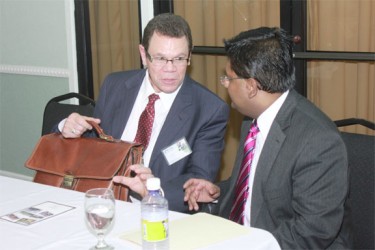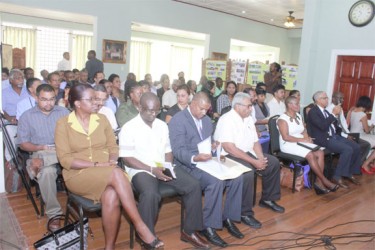Guyana and the Caribbean Development Bank (CDB) yesterday launched the US$7.1 million ($1.45B) seventh cycle of the Basic Needs Trust Fund (BNTF), which will see projects to improve access, education and water and sanitation in a range of communities.
During yesterday’s launch at Duke Lodge, Bernard Lord, Chairman of the BNTF Oversight Committee, said that the grant agreement was initially signed on the 25th February, 2013 and that all of the conditions for the release of the funds have since been satisfied.
Lord said that under the seventh cycle, “we stand to benefit from approximately US$7 million, with US$6.1 million coming via CDB resources.” This accounts for 12% of CDB’s overall 7th cycle BNTF allocation of US$51.7 million.

The additional US$1 million will take the form of counterpart resources and will be contributed by the Government of Guyana, one of the bank’s partners, said Michael Singh, Project Manager of BNTF, Guyana.
The BNTF programme is “a direct targeted poverty reduction programme” and Singh explained that three sectors – Access, Education and Water and Sanitation- will be addressed with the funds under BNTF 7, the current project cycle. This cycle, he said, is somewhat different from its predecessors and will see the construction of community roads, bridges and culverts.
Projects under this cycle, Singh said, will be community-informed. He said that BNTF will be accepting proposals from members of the communities in which the projects are to be carried out. These proposals are to be submitted to the Neighbourhood Democratic Councils (NDCs), which will then submit them to the Regional Democratic Council (RDCs), which will ultimately make the submissions to the BNTF oversight committee.
Previous cycles, he said, saw BNTF carrying out works relating to increasing access to water, education, skills training and improving market places. He said that BNTF 6, for example, which is currently ongoing, involves improving conditions for vulnerable groups, including inmates at the Ptolemy Reid Rehabilitation Centre and members of the Guyana Institute for the Blind.
In addition to these initiatives, he said, 250 women in Region 9 have been taught how to sew and have been provided with sewing machines, with which they can use what they have learned to earn for themselves and their families.
Realising the need for the development of Guyana’s Information and Communication Technology (ICT) sector, Singh said, BNTF Guyana has also created several fully furnished computer labs along the coast and in several other areas, including Leguan Island.

Success stories
He said that this initiative has been especially fruitful and several of the top students of the computer classes have graduated and are now instructing classes in Information Technology.
Albert James, a resident of Leguan and a beneficiary of the ICT initiative, said that the training that he received at the island’s computer lab was invaluable. James said that prior to learning to use the computer he paid hefty sums to persons to prepare documents.
He said that since completing the training, he has bought a computer of his own and has opened a business where he now charges persons to prepare the very documents he was once unable to.
Another success story of BNTF came from Soonita Ranjit, Headmistress of the Bath Settlement Nursery School. Ranjit explained that the nursery school was once housed in the same building as the primary school. This, she said, created a myriad of issues, such as competition for space, which affected the learning experience for students at both the primary and nursery levels. However, the BNTF has since facilitated the construction of a separate building to house the Nursery School which has produced tangible results. Most recognisable among these results, Ranjit said, is the increased capacity and performance of nursery school students entering the primary level.
Though not the only reason, such cases are the primary reason Guyana has continued to benefit from the largest portion of funds made available from the CDB.
CDB President William Warren Smith, who addressed yesterday’s launch, said that in addition to implementation performance, countries party to the CDB receive funding based on their level of need.
“Guyana is getting the largest share of the donations because the country is the one with the greatest need and also because Guyana has utilised the funds effectively. When the funds are used effectively, we score countries higher in terms of their deservedness for receiving resources,” Smith explained.
He disclosed that since the bank started the programme in the 1970s, Guyana continues to benefit from the largest soft loans and grants from the bank’s Special Development Fund (SDF). Up to 2012, he said, Guyana received US$165 million loans at 2% interest payable over 30 years with 10 years for the repayment of the principal.
He said that this sum represents 15% of CDB’s SDF loans to all of its SDF-eligible countries.
“Guyana has also benefitted from US$35 million in grant funds from the bank, which accounts for 11% of all of the SDF grant resources, which have been approved for CDB’s borrowing member countries,” Smith said.
Life changing
Finance Minister Ashni Singh said that projects funded by the bank have been life changing. He alluded to the community roads improvement project, which has been carried out in at least 12 communities. He also made mention of the construction of Vocational Centres in Leonora and Mahaicony and improvements to other such centres around the country. The minister said that students attending these institutions will gain skills which will prepare them for the world of work, in turn improving the efficiency of the entities in which they will eventually work and ultimately contributing to the overall development of the country.
Smith labelled CDB’s partnership in BNTF with Guyana its flagship programme for direct poverty reduction, since it positively impacts persons’ lives in direct, practical and positive ways.
He said that BNTF will continue to address problems persons face on a daily basis, ranging from access to important places to citizen security. However, he added that as the country continues to grow and develop, its needs will decrease as will the amount of funding provided by the bank.
Asked how the bank assesses the projects carried out by the country, Smith said that they are very stringent supervisory provisions.
“What we do is we supervise the implementation of our projects very, very closely. Having said that, it does not mean that we have an absolutely perfect record. There are so many projects going on and we can’t manage them every day,” Smith said.
In the CDB’s 5th and 6th cycles alone, there were over 1,000 sub-projects being carried out. Smith also admitted there are instances where projects have not been implemented as effectively as they should have been, but did not identify specific instances.
Singh, however, highlighted a few areas where BNTF, Guyana did not perform as well as they would have liked.
Some of the difficulties to which Singh alluded include the acquisition of land titles to carry out land-related projects and the unpredictability of drilling wells (whether or not you will find water at a drill site). He also said that because the projects target far-reaching areas, there are usually difficulties accessing these locations.
Notwithstanding these setbacks, Singh said that Guyana continues to set the pace in terms of project implementation. In fact, he said, projects completed under BNTF 5 were so highly rated that Guyana received an additional US$3 million.
Smith said that CDB’s biggest challenge is acquiring adequate resources to satisfy the needs of their member countries. He said that the bank is constantly challenged by its members to demonstrate positive results and added that positive results serve as an incentive for donors to continue making contributions.
He said the donors are very serious about the contributions which they make, since it comes from very scarce tax payers’ money.
One way of winning donor confidence, he said, was to continue documenting success stories. “When we can document these stories and feed them back to the donors. It helps to generate more donations, so they can come closer to closing the gap between the need and the available funding,” Smith said.
All CDB member countries, including Guyana, are donors to the SDF of the BNTF. The biggest donors are the UK, Canada, Trinidad and Tobago and Jamaica.




